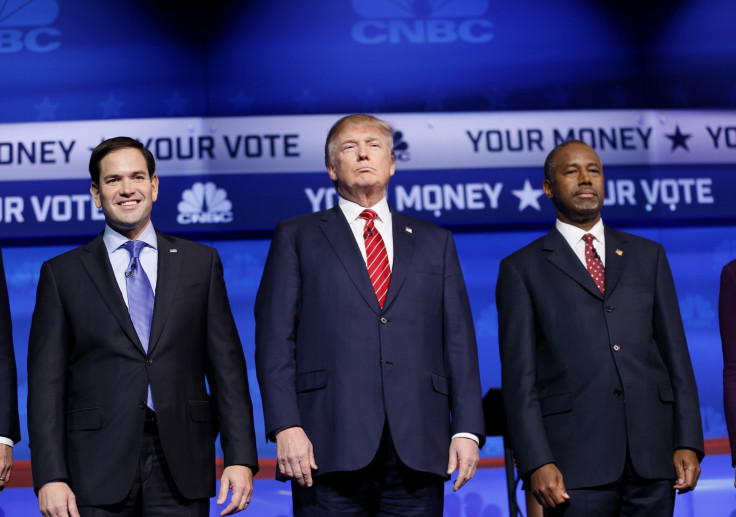Who Won The CNBC Republican Debate? Marco Rubio Praised For Ease, Clarity

Money brought out the best in some of the Republican candidates onstage Wednesday at the third GOP debate, particularly U.S. Sen. Marco Rubio, who was praised by pundits for tackling complicated questions with simple, clear responses. The "Your Money Your Vote" debate hosted by CNBC shook up the scorecard from the last two GOP primary debates.
Rubio's camp was the first to declare him the winner. CNN’s Stephen Collinson reported that the campaign said he won before the debate even ended. "The debate has a half hour to run, but Marco Rubio’s campaign has seen enough," Collinson said. "It’s declaring victory. The Florida senator’s team sent out fundraising pitches based on what his communications director Alex Conant described as Rubio’s “take down of the GOP establishment, the liberal media and Jeb Bush’s campaign.”
Rubio’s political director Jessica Ennis already started reaching out to donors with the news: “Marco is winning the debate right now, so if you’re not watching, get in front of a TV or computer — a radio, even — ASAP.” She included a link for viewers to contribute $5 to Rubio’s campaign.
The Atlantic agreed with Rubio's camp, also hailing him the winner. "Pressed on why he had missed so many Senate votes and why a Florida paper had called on him to step down, he offered an answer about liberal media bias. When Jeb Bush tried to step in to pile on, identifying himself as a disgruntled constituent, Rubio steamrolled him with ease. Rubio also drew a question—yet again—about his own financial difficulties. Having gotten the question many times, he parried it with delight, saying it proved that he understood the troubles of everyday Americans in today’s economy. 'And I make a lot more than the average American. Imagine how hard it is for people making $50, $60,000 a year,' he said," The Atlantic wrote.
This will also be the first debate where Fiorina won't get all of the hype. Clearly will be Rubio and Cruz this time.
— D. Hawkins (@HawkinsUSA) October 29, 2015Some online polls disagreed with the pundits. One Fox News poll found businessman Donald Trump to be the winner with more than 50 percent of the vote. Another Slate online poll also declared Trump to be the winner after the debate ended.
As far as losers of the night go, Hewlett-Packard CEO Carly Fiorina did not rise to the occasion as she has before. "Carly Fiorina came tonight with much of what made her shine in the first debate: crisp answers, prepared zingers and confident delivery," said CNN’s Tal Kopan. "The problem? The tone of the debate this time is different — and she’s fading into the background. From Kasich’s wide swings and firecracker approach, to Ted Cruz’s attacks on the media, to Marco Rubio’s skillful deflection of Jeb Bush’s attack, there’s been plenty to keep audiences applauding, and it hasn’t been Fiorina. Her bounce has been ebbing since the first debate, and it seems that will be a trend that continues based on her performance so far."
Rubio won, Cruz and Trump did well, Carson survived, Christie, Kasich, and Fiorina had moments. Bush's campaign may be over
— Dan Pfeiffer (@danpfeiffer) October 29, 2015
The 10-candidate line up was determined by recent national polls. Four of the other candidates were relegated to a lower-tier debate Wednesday earlier in the night. The candidates selected for the earlier forum were former Pennsylvania Sen. Rick Santorum, Louisiana Gov. Bobby Jindal, former New York Gov. George Pataki and South Carolina Sen. Lindsey Graham.
The undercard debate did no favors for any of the candidates, concluded Slate. "All four GOP hopefuls—already flailing in the polls—looked hopeless, wrote Slate's Josh Voorhees. "It was the third time those four candidates were stuck in non-primetime purgatory, and none of them did anything to convince voters to give them a second look."
Here's one reason many may think Ted Cruz won: He did fabulously in the opening half. The debate was horrible. & many tuned out after 1 hour
— Marc Caputo (@MarcACaputo) October 29, 2015
CNBC tapped anchors Becky Quick, Carl Quintanilla and chief Washington correspondent John Harwood to moderate the debate. The debate was broadcast by CNBC Wednesday in Boulder, Colorado.
© Copyright IBTimes 2025. All rights reserved.





















